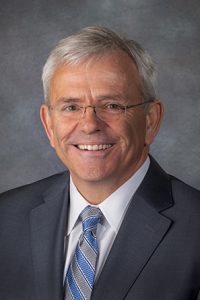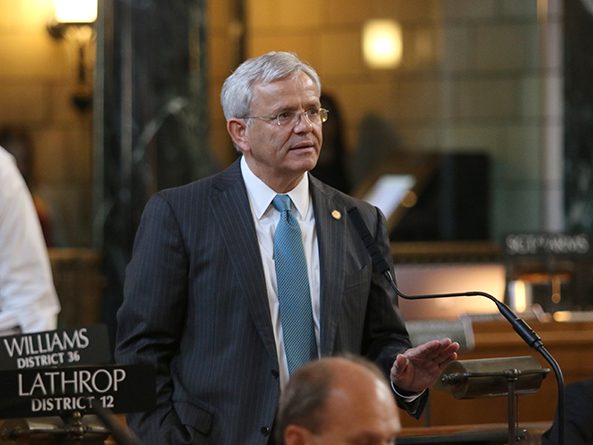Criminal justice reforms advanced
The Legislature advanced a bill from general file May 15 that would make several changes to current criminal justice statutes.

LB686, as originally introduced by Omaha Sen. Steve Lathrop, would have imposed new requirements on the Nebraska Department of Correctional Services for declaring a prison overcrowding emergency.
A Judiciary Committee amendment, adopted 42-0, replaced the bill.
The committee heard 143 bills this year, Lathrop said, many of which were drafted to address overcrowding issues at NDCS.
The amendment includes provisions of LB91, originally sponsored by Omaha Sen. Justin Wayne, which would allow a court to enter a deferred judgement for a person found guilty of committing a crime.
Persons granted a deferred judgment instead would be placed on probation. After successful completion of the terms of probation, he or she would have their charge dismissed without the entry of judgment.
In examining a person’s eligibility for deferred judgment, the court would consider if such a judgment would provide the maximum opportunity for rehabilitation while also maintaining community safety. The court also would consider a defendant’s age, prior record of convictions and deferred judgments, employment and family circumstances, mental health, substance abuse history and the circumstances of the offense.
A defendant would not be eligible for deferred judgement if he or she has a previous felony conviction, has received two or more deferred judgments, has received a deferred judgment in the past five years or is ineligible for probation.
Provisions of Wayne’s LB233 also were included in the committee amendment. These would prohibit a person from bringing an electronic communication device into a correctional facility or providing it to an inmate. Violation of this provision would be a Class I misdemeanor, punishable by up to one year in prison, a $1,000 fine or both.
Attorneys, public counsel employees, law enforcement and first responders would be exempt from the prohibition. The amended bill also would allow for the seizure of such an electronic communication device.
The committee amendment also included provisions of LB739, originally sponsored by Omaha Sen. Tony Vargas, which would prohibit NDCS after Oct. 1, 2019 from placing a member of a vulnerable population in restrictive housing. Vulnerable populations would include inmates who are younger than 18, pregnant or diagnosed with serious mental illness, developmental disabilities or traumatic brain injury.
It would not prevent NDCS from establishing secure mental health housing or placing vulnerable inmates in temporary segregation pending classification.
Finally, the committee amendment incorporated provisions of four additional bills, including:
• LB90, sponsored by Wayne, which would remove a requirement for post-release supervision for Class IV felonies;
• LB240, sponsored by Lincoln Sen. Matt Hansen, which would allow a private contract facility to provide treatment to criminal defendants found to be mentally incompetent to stand trial;
• LB262, sponsored by Bennington Sen. Wendy DeBoer, which would require the NDCS director to share the annual restrictive housing report with members of the long-term restrictive housing work group prior to release of the report; and
• LB684, sponsored by Lathrop, which would allow judges to sentence a person found to have violated terms of post-release supervision to a period of incarceration equal to the length of his or her original term of post-release supervision.
Lincoln Sen. Patty Pansing Brooks spoke in support of LB686 as amended, but cautioned that it is insufficient to address ongoing problems at NDCS.
“I believe this package [of bills] does not go nearly far enough …” she said. “This [legislative] body has continually kicked the can down the road when it comes to addressing some of the issues at the root of overcrowding problems.”
Senators advanced the bill to select file on a 40-0 vote.


